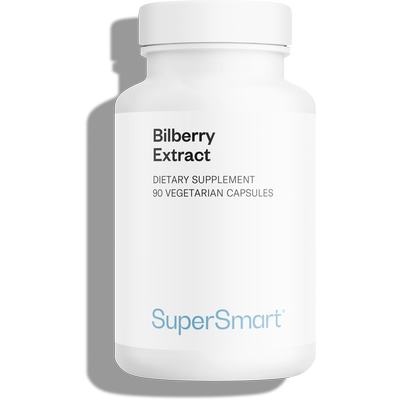04-03-2019
The protective effect of bilberries against cardiovascular disease
 The bilberry, or to give it its scientific name Vaccinium myrtillus L., is one of the richest sources of anthocyanins or anthocyanosides1. Part of the large family of polyphenols and its flavonoid sub-group, these elements are responsible for bilberry’s blue-black colour as well as it health benefits. The bilberry has many properties, as summarised in the book Herbal Medicine: Biomolecular and Clinical Aspects, the best-known of which is its positive effect on vision. More recently, scientists have demonstrated a new benefit for the fruit – that of preventing certain cardiovascular diseases.
The bilberry, or to give it its scientific name Vaccinium myrtillus L., is one of the richest sources of anthocyanins or anthocyanosides1. Part of the large family of polyphenols and its flavonoid sub-group, these elements are responsible for bilberry’s blue-black colour as well as it health benefits. The bilberry has many properties, as summarised in the book Herbal Medicine: Biomolecular and Clinical Aspects, the best-known of which is its positive effect on vision. More recently, scientists have demonstrated a new benefit for the fruit – that of preventing certain cardiovascular diseases.
Bilberries for improving the lipid profile
Though already the subject of numerous scientific studies, these small berries could become the focus of fresh research following recent findings by scientists at the Slovak University of Agriculture in Nitra relating to the effects of bilberry consumption on lipid metabolism 2. Conducted in 2013, the study monitored 18 women and 7 men who were consuming 150 grams of bilberries three times a week. After six weeks, the researchers observed an overall fall in cholesterol levels. In particular, they noted decreases in the ‘bad’ type – LDL-cholesterol, as well as in triglycerides. Results were similar for men and women, apart from a slight increase in the ‘good’ type of cholesterol – HDL – in the women. These initial results show that regular consumption of bilberries may improve the lipid profile by reducing cholesterol levels.Bilberries for preventing cardiovascular disease
As a result of these highly-promising findings, the Slovak researchers extended their investigations to evaluate the benefits of bilberry consumption in preventing cardiovascular disease3. Adopting similar methods to their first study, they performed analyses on 25 women and 11 men consuming bilberries three times a week for six weeks. In addition to recording participants’ cholesterol levels, the researchers took into account anthropometric measurements such as weight and BMI, as well as blood pressure. They also analysed blood glucose, liver enzymes, creatinine, albumin and magnesium levels, and radical activity. As with their previous study, the researchers observed decreases in total and LDL-cholesterol levels, as well as in triglycerides. Unlike the first study, no differences were noted between men and women, with increases in HDL-cholesterol observed in both. Aside from the lipid profile, they observed decreases in blood glucose levels and certain liver enzymes, including gamma-glutamyltransferase in the women and aspartate aminotransferase in the men. This finding is very encouraging since high levels of these enzymes are considered a sign of disease. These results therefore suggest that consumption of bilberries may be associated with a reduction in risk factors for cardiovascular disease.> Sources :
1. Chu W, Cheung SCM, Lau RAW, Benzie IFF, « Bilberry (Vaccinium myrtillus L.) », Herbal Medicine: Biomolecular and Clinical Aspects, 2nd edition, Boca Raton (FL): CRC Press/Taylor & Francis, 2011, Chapter 4.
2. Marta Habanova, Miroslav Haban, Peter Chlebo, Marianna Schwarzova, « Changes of plasma lipids in relation to the regular consumtpion of bilberries (Vaccinium Myrtillus L.) », Potravinarstvo, February 2013, 7(1):1-6.
3. Marta Habanova, Jorge A. Saraiva, Miroslav Haban, Marianna Schwarzova, Peter Chlebo, Lenka Predna, Jan Gažo, Joanna Wykaemail, « Intake of bilberries (Vaccinium myrtillus L.) reduced cardiovascular diseases risk factors through positive influences in lipoprotein profiles », Nutrition Research, Nov 2016.
Order the nutrient mentioned in this article

A bilberry extract for improving microcirculation and reducing visual fatigue
www.supersmart.comFurther reading
07-06-2016
Imagine a nutrient that could prevent wrinkles, slackening and ageing of the skin, not just on the face (eyelids, cheeks, lips) but also on the...
Read more22-05-2017
An Indian research team has just made a surprising discovery in relation to the accumulation of ‘bad’ cholesterol in the arteries 1 ; a combination...
Read more04-09-2019
A study published in Hypertension , the journal of the American Heart Association, has provided new evidence of this dietary supplement’s effectiveness for reducing the...
Read more© 1997-2025 Fondation pour le Libre Choix
All rights reserved
All rights reserved
Free
Thank you for visiting our site. Before you go
REGISTER WITHClub SuperSmart
And take advantage
of exclusive benefits:
of exclusive benefits:
- Free: our weekly science-based newsletter "Nutranews"
- Special offers for club members only

















